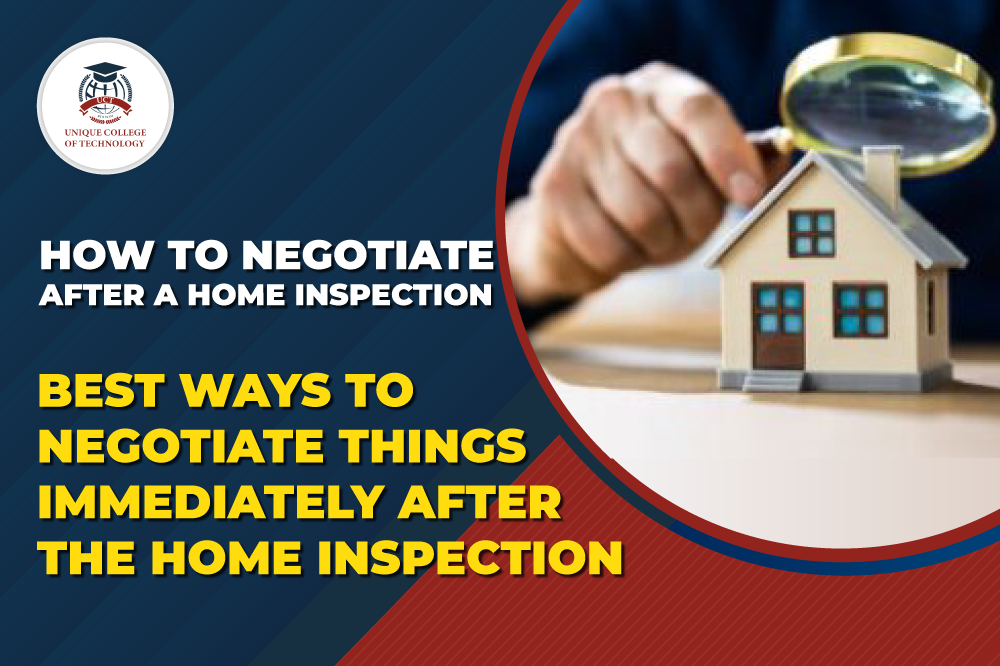How To Negotiate After A Home Inspection Things Immediately

A home inspection can be a good thing. It allows you to find out the condition of your new home before you buy it, and it gives you a chance to renegotiate with the seller if there are any problems. Suppose you have someone who can accompany you to the inspection, so much the better. Be sure to bring a notepad and pen to make detailed notes of what is said and done and take pictures of items that the inspector points out. You’ll be glad that you spent the time writing things down later.
The post-inspection home negotiation process has a lot of moving parts. There are potentially a lot of emotions involved and several decisions to be made, especially for the seller. If repairs need to be made, the buyer will request that the seller pays for them before closing the transaction. Sellers are forced to decide whether they can afford to do this or ask the buyer to sign a waiver acknowledging that they have accepted the property ‘as is and expect no further compensation for problems or previously unknown setbacks. So, let’s get to know some of the essential terms that need to understand how to negotiate after a home inspection.
10 Best Ways to Negotiate While You Are Doing A Home Inspection
Dealing with a home inspection after you’ve made an offer on the property can be a stressful time. This is especially true if the report reveals problems with the house that the seller won’t agree to fix. It’s during this time that you might want to negotiate with your real estate agent about settling for another house or trying for price cuts on the home. Here’s what you need to know about negotiating after a home inspection.
Review The Overall Report
Sometimes reviewing things can pull the best points where you can cut the price of a house or smoothly make your deal. Not like others, many agents want to make it short at a high price. For that, an inspection of all the documents and pricing things can turn the bottle favoring you.
Prioritize Repairs by Cost and Severity
If you’re unhappy about any of the problems reported in the home inspection report, communicate your disappointment with the seller and real estate agent before any negotiations start. You may want to ask them if they can repair the problems or cut costs elsewhere to help make up for it.
Don’t Turn The Small Stuff
Sellers will typically refuse to address cosmetic issues such as loose boards or chipped paint or any repair that costs less than $100 unless something is a building code violation, structural issue, or severe safety concern. Unless the problem is urgent and very expensive, just plan to take care of it yourself after buying the house.
Request Cut for Major Items
Any serious concerns you have, such as sagging foundations, a decrepit roof, malfunctioning HVAC systems, or mold, should be addressed by the seller in some way. Ask them to complete the repairs as a condition of closing the deal, but if that’s not an option, a price reduction is reasonable. You might also request a cash credit at closing if your lender permits. Time is often of the essence for both parties in a real estate transaction, so getting a price reduction to compensate for the cost of repairs is often preferred by all.
Get Quotes from Contractors
The best way to negotiate with the seller after a home inspection is to work with your agent to get repair estimates and bring those to the table. Home inspectors do not provide repair estimates, so you’ll need to get your own quotes from contractors to gauge how much you’ll need if you agree to take a price reduction in lieu of the seller making repairs. You can share any quotes you receive with the seller to justify the amount of reduction or cash you request for repairs.
Consider The Market Line
After a home inspection, you may find yourself at odds with the seller over necessary repairs. Before deciding on how to approach negotiations, consider whether you’re in a buyer’s market or a seller’s market. If you’re in a seller’s market, be wary of asking for too much or being too nitpicky about repairs. If the seller received multiple offers, for example, then you don’t have much leverage when asking for an abundance of repairs.
Be Reasonable
After the inspection, you can negotiate with the seller. Sellers may agree to make some repairs before closing, or you might ask for a reduction on the home’s purchase price. It’s also possible that you will pull out of the sale and start looking at other houses in the area. Your real estate agent can help you decide which option is best for your understand.
Know When to Close
When you’re about to close on a house, you probably want to know what your final costs will be. The home inspector you hire can give you an idea of any significant repairs that you might need, but it’s not a bad idea to have a general idea of how much the small things will cost, too.
Final Words
When the home inspection is complete and the final report delivered, most buyers will request a reduction in the price based on repair needs. If the seller believes that fixing the item is too costly or disruptive, or if they simply don’t want to pay for it, they can ask for a disclaimer from the buyer. This document relieves both parties of any further risk of repairs on items discovered during the inspection. It’s essential to know your rights and understand what you will be responsible for as a buyer before agreeing to sign this document.

